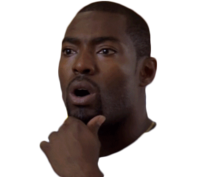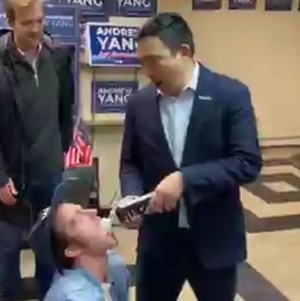fr though the implications of the WV vs EPA decision could be history changing if they side with WV. like if they side with WV how do you even proceed after that? Would that not be a contradictory admission the SC itself also has no jurisdiction over states? is all delegation outside of state government unconstitutional? will every agency regulated by branches be considered unconstitutional? will congress be forced to actually legislate (LOL)?
 krishna bound
krishna boundfr though the implications of the WV vs EPA decision could be history changing if they side with WV. like if they side with WV how do you even proceed after that? Would that not be a contradictory admission the SC itself also has no jurisdiction over states? is all delegation outside of state government unconstitutional? will every agency regulated by branches be considered unconstitutional? will congress be forced to actually legislate (LOL)?
the Supreme Court are based anti-US accelerationist all along

 Womanpuncher69
Womanpuncher69the Supreme Court are based anti-US accelerationist all along

"I'm a leninist" -Steve Bannon

The Supreme Court on Tuesday reinstated a Republican-drawn map of Louisiana's six U.S. House of Representatives districts that had been blocked by a judge who found that it likely discriminates against Black voters, a setback for Democrats as they try to retain control of Congress in November's elections.
The justices granted a request by Louisiana's Republican secretary of state to put on hold U.S. District Judge Shelly D***'s injunction requiring a new map that has a second district where Black voters represent the majority of voters rather than just one in the version adopted by the Republican-led state legislature.
The conservative-majority nine-member court's three liberal justices dissented from the decision.
Democrats control the U.S. House by a slim margin, making every seat vital in Republican efforts to wrest control from President Joe Biden's party one or both chambers of Congress in the midterm elections.
The New Orleans-based 5th U.S. Circuit Court of Appeals on June 12 had refused to reinstate the Republican-drawn Louisiana districts, calling evidence presented by Black voters who challenged the map "stronger" than evidence presented in defense of the map.
The plaintiffs said in their lawsuit that the Republican-drawn map maximizes "political power for white citizens" by packing large numbers of Black voters into a single district and dispersing the rest into the five others where they are too few to elect their preferred candidates.
The Louisiana legislature passed the map in February. Democratic Governor Jon Bel Edwards then vetoed it - criticizing it for failing to include a second Black-majority district considering that Black voters comprise almost a third of the state's population - but the legislature overrode the veto.
Democrats have accused Republicans of exploiting state legislature majorities to draw electoral maps that dilute the clout of Black and other minority voters, who tend to support Democratic candidates. Republicans have said the consideration of race in drawing electoral maps must be limited.
After the map was challenged by groups of Black voters - one alongside civil rights groups including the Louisiana NAACP - the judge ruled that the way it was drawn likely violated the Voting Rights Act. That landmark 1965 federal law for decades has been used to counter racially biased actions in voting and drawing electoral districts.
The plaintiffs said that in Louisiana, "stark racially polarized voting almost universally leads to the electoral defeat of Black-preferred candidates."
Louisiana Secretary of State Kyle Ardoin said in his legal filing that the judge's order to adopt a second majority-Black district requires race to predominate in the map-making process, in violation of the U.S. Constitution's 14th Amendment guarantee of equal protection under the law.
The Louisiana dispute mirrors one from Alabama that the Supreme Court has already agreed to hear that could further weaken the Voting Rights Act. Arguments in the Alabama case are scheduled for Oct. 4. The eventual ruling, due by the end of June 2023, could make it harder for courts to consider race when determining whether an electoral district map violates the Voting Rights Act's Section 2, which bars voting practices that result in racial discrimination.
The Supreme Court's order on Tuesday said they justices would take up the Louisiana case and hold it until it decides the Alabama case.
The Louisiana case is among dozens of legal challenges nationwide over the composition of electoral districts, which are redrawn each decade to reflect population changes as measured by a national census, last taken in 2020.
In most states, such redistricting is done by the party in power, which can lead to map manipulation for partisan gain.In a ruling last July in favor of Republican-backed voting restrictions in Arizona, the Supreme Court made it harder to prove violations under Section 2.
 TorturedSonic
TorturedSonichttps://www.reuters.com/world/us/us-supreme-court-reinstates-louisiana-electoral-map-faulted-racial-bias-2022-06-28/
The Supreme Court on Tuesday reinstated a Republican-drawn map of Louisiana's six U.S. House of Representatives districts that had been blocked by a judge who found that it likely discriminates against Black voters, a setback for Democrats as they try to retain control of Congress in November's elections.
The justices granted a request by Louisiana's Republican secretary of state to put on hold U.S. District Judge Shelly D***'s injunction requiring a new map that has a second district where Black voters represent the majority of voters rather than just one in the version adopted by the Republican-led state legislature.
The conservative-majority nine-member court's three liberal justices dissented from the decision.
Democrats control the U.S. House by a slim margin, making every seat vital in Republican efforts to wrest control from President Joe Biden's party one or both chambers of Congress in the midterm elections.
The New Orleans-based 5th U.S. Circuit Court of Appeals on June 12 had refused to reinstate the Republican-drawn Louisiana districts, calling evidence presented by Black voters who challenged the map "stronger" than evidence presented in defense of the map.
The plaintiffs said in their lawsuit that the Republican-drawn map maximizes "political power for white citizens" by packing large numbers of Black voters into a single district and dispersing the rest into the five others where they are too few to elect their preferred candidates.
The Louisiana legislature passed the map in February. Democratic Governor Jon Bel Edwards then vetoed it - criticizing it for failing to include a second Black-majority district considering that Black voters comprise almost a third of the state's population - but the legislature overrode the veto.
Democrats have accused Republicans of exploiting state legislature majorities to draw electoral maps that dilute the clout of Black and other minority voters, who tend to support Democratic candidates. Republicans have said the consideration of race in drawing electoral maps must be limited.
After the map was challenged by groups of Black voters - one alongside civil rights groups including the Louisiana NAACP - the judge ruled that the way it was drawn likely violated the Voting Rights Act. That landmark 1965 federal law for decades has been used to counter racially biased actions in voting and drawing electoral districts.
The plaintiffs said that in Louisiana, "stark racially polarized voting almost universally leads to the electoral defeat of Black-preferred candidates."
Louisiana Secretary of State Kyle Ardoin said in his legal filing that the judge's order to adopt a second majority-Black district requires race to predominate in the map-making process, in violation of the U.S. Constitution's 14th Amendment guarantee of equal protection under the law.
The Louisiana dispute mirrors one from Alabama that the Supreme Court has already agreed to hear that could further weaken the Voting Rights Act. Arguments in the Alabama case are scheduled for Oct. 4. The eventual ruling, due by the end of June 2023, could make it harder for courts to consider race when determining whether an electoral district map violates the Voting Rights Act's Section 2, which bars voting practices that result in racial discrimination.
The Supreme Court's order on Tuesday said they justices would take up the Louisiana case and hold it until it decides the Alabama case.
The Louisiana case is among dozens of legal challenges nationwide over the composition of electoral districts, which are redrawn each decade to reflect population changes as measured by a national census, last taken in 2020.
In most states, such redistricting is done by the party in power, which can lead to map manipulation for partisan gain.In a ruling last July in favor of Republican-backed voting restrictions in Arizona, the Supreme Court made it harder to prove violations under Section 2.
F***ing christ lmao. So much bs going on
 TorturedSonic
TorturedSonichttps://www.reuters.com/world/us/us-supreme-court-reinstates-louisiana-electoral-map-faulted-racial-bias-2022-06-28/
The Supreme Court on Tuesday reinstated a Republican-drawn map of Louisiana's six U.S. House of Representatives districts that had been blocked by a judge who found that it likely discriminates against Black voters, a setback for Democrats as they try to retain control of Congress in November's elections.
The justices granted a request by Louisiana's Republican secretary of state to put on hold U.S. District Judge Shelly D***'s injunction requiring a new map that has a second district where Black voters represent the majority of voters rather than just one in the version adopted by the Republican-led state legislature.
The conservative-majority nine-member court's three liberal justices dissented from the decision.
Democrats control the U.S. House by a slim margin, making every seat vital in Republican efforts to wrest control from President Joe Biden's party one or both chambers of Congress in the midterm elections.
The New Orleans-based 5th U.S. Circuit Court of Appeals on June 12 had refused to reinstate the Republican-drawn Louisiana districts, calling evidence presented by Black voters who challenged the map "stronger" than evidence presented in defense of the map.
The plaintiffs said in their lawsuit that the Republican-drawn map maximizes "political power for white citizens" by packing large numbers of Black voters into a single district and dispersing the rest into the five others where they are too few to elect their preferred candidates.
The Louisiana legislature passed the map in February. Democratic Governor Jon Bel Edwards then vetoed it - criticizing it for failing to include a second Black-majority district considering that Black voters comprise almost a third of the state's population - but the legislature overrode the veto.
Democrats have accused Republicans of exploiting state legislature majorities to draw electoral maps that dilute the clout of Black and other minority voters, who tend to support Democratic candidates. Republicans have said the consideration of race in drawing electoral maps must be limited.
After the map was challenged by groups of Black voters - one alongside civil rights groups including the Louisiana NAACP - the judge ruled that the way it was drawn likely violated the Voting Rights Act. That landmark 1965 federal law for decades has been used to counter racially biased actions in voting and drawing electoral districts.
The plaintiffs said that in Louisiana, "stark racially polarized voting almost universally leads to the electoral defeat of Black-preferred candidates."
Louisiana Secretary of State Kyle Ardoin said in his legal filing that the judge's order to adopt a second majority-Black district requires race to predominate in the map-making process, in violation of the U.S. Constitution's 14th Amendment guarantee of equal protection under the law.
The Louisiana dispute mirrors one from Alabama that the Supreme Court has already agreed to hear that could further weaken the Voting Rights Act. Arguments in the Alabama case are scheduled for Oct. 4. The eventual ruling, due by the end of June 2023, could make it harder for courts to consider race when determining whether an electoral district map violates the Voting Rights Act's Section 2, which bars voting practices that result in racial discrimination.
The Supreme Court's order on Tuesday said they justices would take up the Louisiana case and hold it until it decides the Alabama case.
The Louisiana case is among dozens of legal challenges nationwide over the composition of electoral districts, which are redrawn each decade to reflect population changes as measured by a national census, last taken in 2020.
In most states, such redistricting is done by the party in power, which can lead to map manipulation for partisan gain.In a ruling last July in favor of Republican-backed voting restrictions in Arizona, the Supreme Court made it harder to prove violations under Section 2.
this is one of those cases which just doesnt really have a fair solution either way within the current electoral system
 krishna bound
krishna boundim interested in Oklahoma v. Castro-Huerta because im pretty sure theres a prior case that the state cant prosecute native americans who committed crimes against non-natives on reservations. if the decision isn't parallel to that decision then it imbalances the relationship of reservations to the state
5-4 for Oklahoma
Gorsuch dissenting naturally
Reading the opinion right now gabapentin
gabapentin5-4 for Oklahoma
Gorsuch dissenting naturally
Reading the opinion right nowseems like the decision basically just affirms extraterritorial jurisdiction?
 krishna bound
krishna boundseems like the decision basically just affirms extraterritorial jurisdiction?
well not exactly
kavanaugh says that "Indian country is part of the State, not separate from the State" and that "as a matter of state sovereignty, a State has jurisdiction over all of its territory, including Indian country." he admits that in the early days of the United States, such as in the Court's decision in Worcester v. Georgia (1832) "the Federal Government sometimes treated Indian country as separate from state territory—in the same way that, for example, New Jersey is separate from New York." However he cites a case from 1962 to say that “By 1880 the Court no longer viewed reservations as distinct nations."
so he says "It is part of the State," i.e, that it's not really extraterritorial for Oklahoma to prosecute the crimes at issue in Indian country. he then goes on to say that the General Crimes Act did not give the federal government exclusive jurisdiction over crimes in Indian country.
gorsuch disagrees that Indian country at some vague point stopped being extraterritorial, asking "...exactly when and how did this change happen? The Court never explains." He accuses kavanaugh of "assembling a string of carefully curated snippets—a clause here, a sentence there—from six "decisions out of the galaxy of this Court’s Indian law jurisprudence." The case from 1962, which he derisively charges that "the Court seems to think is some magic bullet," is claimed to be completely misinterpreted by brett k.
 gabapentin
gabapentinwell not exactly
kavanaugh says that "Indian country is part of the State, not separate from the State" and that "as a matter of state sovereignty, a State has jurisdiction over all of its territory, including Indian country." he admits that in the early days of the United States, such as in the Court's decision in Worcester v. Georgia (1832) "the Federal Government sometimes treated Indian country as separate from state territory—in the same way that, for example, New Jersey is separate from New York." However he cites a case from 1962 to say that “By 1880 the Court no longer viewed reservations as distinct nations."
so he says "It is part of the State," i.e, that it's not really extraterritorial for Oklahoma to prosecute the crimes at issue in Indian country. he then goes on to say that the General Crimes Act did not give the federal government exclusive jurisdiction over crimes in Indian country.
gorsuch disagrees that Indian country at some vague point stopped being extraterritorial, asking "...exactly when and how did this change happen? The Court never explains." He accuses kavanaugh of "assembling a string of carefully curated snippets—a clause here, a sentence there—from six "decisions out of the galaxy of this Court’s Indian law jurisprudence." The case from 1962, which he derisively charges that "the Court seems to think is some magic bullet," is claimed to be completely misinterpreted by brett k.
if they say Indian country is part of the state then doesn't that imply it's a US territory and not sovereign governments as they've been considered historically?
 krishna bound
krishna boundif they say Indian country is part of the state then doesn't that imply it's a US territory and not sovereign governments as they've been considered historically?
Kavanaugh pretty explicitly seems to be saying something close to

Gorsuch ofc is pretty salty: “The source of the Court’s error is foundational. Through most of its opinion, the Court proceeds on the premise that Oklahoma possesses “inherent” sovereign power to prosecute crimes on tribal reservations until and unless Congress “preempts” that authority… The Court emphasizes that States normally wield broad police powers within their borders absent some preemptive federal law… But the effort to wedge Tribes into that paradigm is a category error. Tribes are not private organizations within state boundaries. Their reservations are not glorified private campgrounds. Tribes are sovereigns. And the preemption rule applicable to them is exactly the opposite of the normal rule. Tribal sovereignty means that the criminal laws of the States “can have no force” on tribal members within tribal bounds unless and until Congress clearly ordains otherwise… After all, the power to punish crimes by or against one’s own citizens within one’s own territory to the exclusion of other authorities is and has always been among the most essential attributes of sovereignty.”
 gabapentin
gabapentinKavanaugh pretty explicitly seems to be saying something close to

lmao imaging indian territories being forced to vote in primaries like samoa/guam
"Nor is this “‘notion,’” ante, at 5, some discarded artifact of a bygone era. To be sure, Washington, Jefferson, Marshall, and so many others at the Nation’s founding appreciated the sovereign status of Native American Tribes. See Part I–A, supra. But this Court’s own cases have consistently reaffirmed the point. Just weeks ago, the Court held that federal prosecutors did not violate the Double Jeopardy Clause based on the essential premise that tribal criminal law is the product of a “separate sovereign” exercising its own “retained sovereignty” in Denezpi v. United States, which dropped June 13th lol... Throughout our history, “the basic policy of Worcester” that Tribes are separate sovereigns “has remained...""
This is basically a mic drop. That Denezpi case was literally one where all five votes in the majority in this case affirmed the "retained sovereignty" of tribes, including, of course, Brett himself.
I think Gorsuch clearly has the law on his side here, but at the same time tho I'm gonna be frank, the state of Oklahoma not having the authority to enforce the law in 43% of the state, and leaving it to the tribes and the feds, is not proving to be a desirable state of affairs, and even the Biden Justice Department has agreed that they can't really handle the responsibility and s*** is getting wild out there
So it's a sticky wicket
 gabapentin
gabapentinI think Gorsuch clearly has the law on his side here, but at the same time tho I'm gonna be frank, the state of Oklahoma not having the authority to enforce the law in 43% of the state, and leaving it to the tribes and the feds, is not proving to be a desirable state of affairs, and even the Biden Justice Department has agreed that they can't really handle the responsibility and s*** is getting wild out there
So it's a sticky wicket
this is the second time gorsuch has ruled in favor of tribes no?
@op SC sided with WV over the EPA, massive vibe shift incoming
EPA argued that under the major questions doctrine, a
clear statement was necessary to conclude that Congress
intended to delegate authority “of this breadth to regulate
a fundamental sector of the economy.” Ibid. It found none.
“Indeed,” it concluded, given the text and structure of the
statute, “Congress has directly spoken to this precise ques-
tion and precluded” the use of measures such as generation
shifting.implosion of the federal government soon

Such cases have arisen from all corners of the adminis-
trative state. In Brown & Williamson, for instance, the
Food and D*** Administration claimed that its authority
over “drugs” and “devices” included the power to regulate,
and even ban, tobacco products. Id., at 126–127. We re-
jected that “expansive construction of the statute,” conclud-
ing that “Congress could not have intended to delegate”
such a sweeping and consequential authority “in so cryptic
a fashion.” Id., at 160. In Alabama Assn. of Realtors v. De-
partment of Health and Human Servs., 594 U. S. ,
(2021) (per curiam) (slip op., at 3), we concluded that the
Centers for Disease Control and Prevention could not, un-
der its authority to adopt measures “necessary to prevent
the . . . spread of ” disease, institute a nationwide eviction
moratorium in response to the COVID–19 pandemic. We
found the statute’s language a “wafer-thin reed” on which
to rest such a measure, given “the sheer scope of the CDC’s
claimed authority,” its “unprecedented” nature, and the fact
that Congress had failed to extend the moratorium after
previously having done so. Id., at – (slip op., at 6–8).if you're a federal employee of a bureacratic agency i may consider finding a new job after this ruling
Our decision in Utility Air addressed another question re-
garding EPA’s authority—namely, whether EPA could con-
strue the term “air pollutant,” in a specific provision of the
Clean Air Act, to cover greenhouse gases. 573 U. S., at 310. Despite its textual plausibility, we noted that the Agency’s
interpretation would have given it permitting authority
over millions of small sources, such as hotels and office
buildings, that had never before been subject to such re-
quirements. Id., at 310, 324. We declined to uphold EPA’s
claim of “unheralded” regulatory power over “a significant
portion of the American economy.” Id., at 324. In Gonzales
v. Oregon, 546 U. S. 243 (2006), we confronted the Attorney
General’s assertion that he could rescind the license of any
physician who prescribed a controlled substance for as-
sisted suicide, even in a State where such action was legal.
The Attorney General argued that this came within his
statutory power to revoke licenses where he found them “in-
consistent with the public interest,” 21 U. S. C. §823(f ). We
considered the “idea that Congress gave him such broad
and unusual authority through an implicit delegation . . .
not sustainable.” 546 U. S., at 267. Similar considerations
informed our recent decision invalidating the Occupational
Safety and Health Administration’s mandate that “84 mil-
lion Americans . . . either obtain a COVID–19 vaccine or un-
dergo weekly medical testing at their own expense.” Na-
tional Federation of Independent Business v. Occupational
Safety and Health Administration, 595 U. S. , (2022)
(per curiam) (slip op., at 5). We found it “telling that OSHA,
in its half century of existence,” had never relied on its au-
thority to regulate occupational hazards to impose such a
remarkable measure. Id., at ___ (slip op., at 8).lmfao at taking a break to just do the legal equivalent of s***ting on OSHA
